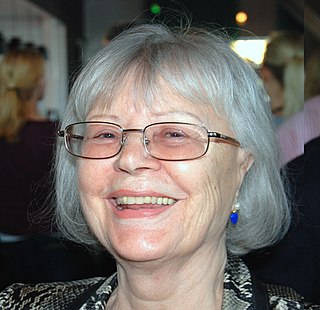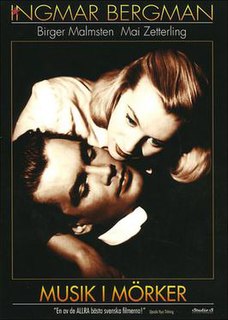
Ingrid Lilian Thulin was a Swedish film actress.

Face to Face is a 1976 Swedish psychological drama film written and directed by Ingmar Bergman. It tells the story of a psychiatrist who is suffering from a mental illness. It stars Liv Ullmann and Erland Josephson.

The Rite is a 1969 Swedish drama film written and directed by Ingmar Bergman. It premiered on Swedish television on 25 March 1969. Actors Thea, Sebastian and Hans are sequestered in the offices of Judge Abrahamson, who questions them about the play they have been performing, which has been accused of being obscene. As the judge interviews them separately and together, the three performers work through their considerable psycho-sexual baggage with each other, while collectively laying siege to the sensibilities of their authoritarian interrogator.

Harriet Andersson is a Swedish actress, best known outside Sweden for being part of director Ingmar Bergman's stock company. She often plays impulsive, working class characters.

The Making of Fanny and Alexander is a 1984 Swedish documentary film directed by Ingmar Bergman which traces the making of his film Fanny and Alexander. Its running length is 110 minutes and it is photographed by Arne Carlsson. It debuted at the Swedish Film Institute on 16 September 1984, with Bergman in attendance to give a speech. It then aired with a television repeat of Fanny and Alexander in Sweden on 18 August 1986. In 2011 in Region A, The Criterion Collection released The Making of Fanny and Alexander on Blu-ray as part of their release of Fanny and Alexander.

Knut Gunnar Johanson was a Swedish actor known for his frequent work with writer and director Ingmar Bergman.
The National Academy of Mime and Acting (NAMA), was a school in Stockholm for acting and mime. This institution was also known under additional different names in English, including Stockholm University College of Acting and Stockholm Academy of Dramatic Arts.

It Rains on Our Love is a 1946 Swedish drama film directed by Ingmar Bergman. The screenplay was written by Herbert Grevenius and Bergman, based on the Norwegian play Bra Mennesker by Oskar Braaten. It Rains on Our Love is the first film directed by Bergman to include actor Gunnar Björnstrand in a credited role. Björnstrand would go on to act in nearly twenty of Bergman's films.

Music in Darkness, known in the United States as Night Is My Future, is a 1948 Swedish drama film directed by Ingmar Bergman.

Torment is a 1944 Swedish film, directed by Alf Sjöberg from a screenplay by Ingmar Bergman. The film, a tale of sex, passion and murder, was originally released as Frenzy in the United Kingdom, although later releases have used the US title. The film won the Grand Prix at the 1946 Cannes Film Festival.

The Pleasure Garden, is a 1961 Swedish comedy film directed by Alf Kjellin and written by Ingmar Bergman.
The Guldbagge for Best Director is a Swedish film award presented annually by the Swedish Film Institute (SFI) as part of the Guldbagge Awards to directors working in the Swedish motion picture industry.
The 1st Guldbagge Awards ceremony, presented by the Swedish Film Institute, honored the best Swedish 1963 and 1964, and took place on 25 September 1964. The Silence directed by Ingmar Bergman was presented with the award for Best Film.
The 9th Guldbagge Awards ceremony, presented by the Swedish Film Institute, honored the best Swedish films of 1972 and 1973, and took place on 29 October 1973. Cries and Whispers directed by Ingmar Bergman was presented with the award for Best Film.
The 14th Guldbagge Awards ceremony, presented by the Swedish Film Institute, honored the best Swedish films of 1977 and 1978, and took place on 18 September 1978. The Adventures of Picasso directed by Tage Danielsson was presented with the award for Best Film.
The 15th Guldbagge Awards ceremony, presented by the Swedish Film Institute, honored the best Swedish films of 1978 and 1979, and took place on 24 September 1979. A Respectable Life directed by Stefan Jarl was presented with the award for Best Film.
The 16th Guldbagge Awards ceremony, presented by the Swedish Film Institute, honored the best Swedish films of 1979 and 1980, and took place on 22 September 1980. To Be a Millionaire directed by Mats Arehn was presented with the award for Best Film. The awards for Best Director and Best Actress were not presented.
The 19th Guldbagge Awards ceremony, presented by the Swedish Film Institute, honored the best Swedish films of 1982 and 1983, and took place on 31 October 1983. Fanny and Alexander directed by Ingmar Bergman was presented with the award for Best Film.
The 22nd Guldbagge Awards ceremony, presented by the Swedish Film Institute, honored the best Swedish films of 1986, and took place on 2 February 1987. The Sacrifice directed by Andrei Tarkovsky was presented with the award for Best Film.
Jens Fischer is a Swedish cinematographer. According to Criterion Cast, Jens Fischer is known as "one of the most distinguished Swedish cinematographers of the 1990s and 2000s."










